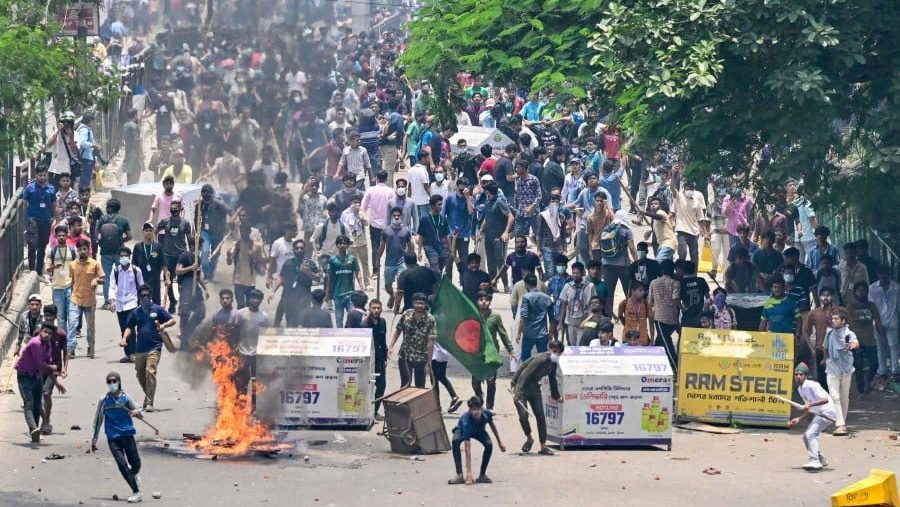Nationwide Unrest Grips Bangladesh Over Job Reservation System

In recent days, Bangladesh has witnessed a dramatic escalation of violence and civil unrest, with nationwide protests erupting over a contentious job reservation system. Clashes between students, pro-government supporters, and armed police have intensified, leading to a crisis that has left dozens dead and hundreds injured. Here’s an in-depth look at the unfolding situation and its implications.
The Core of the Protests
Quota System and Its Discontents
The root of the unrest lies in the country’s civil service job quota system, which reserves a significant portion of government jobs for certain groups. Specifically, 30% of these coveted positions are allocated to the children of “freedom fighters”—individuals who fought in Bangladesh’s 1971 war of independence from Pakistan. This policy, intended to honor the sacrifices of those who contributed to the nation’s liberation, has come under scrutiny as many argue it fosters nepotism and undermines meritocracy.
Students and job seekers are demanding an overhaul of this quota system, arguing that it unfairly disadvantages qualified individuals who do not belong to these reserved categories. Maruf Khan, a Bangladeshi student currently studying in Australia, voiced his frustration: “About 500,000 to 600,000 people are competing for 600 to 700 government jobs, and on top of that, it includes a 56% quota. It’s not easy.”
Economic Disparities and High Unemployment
The frustration is compounded by high unemployment rates and economic disparities. Despite impressive economic growth in recent years, the post-pandemic era has seen a slowdown. The World Bank has highlighted a widening gap in urban inequality, with over 30 million people out of work or education in a nation of 170 million.
How the Protests Have Unfolded
Escalation of Violence
What began as peaceful demonstrations at Dhaka University on July 1 quickly escalated into widespread violence. On July 15, clashes broke out when members of the Bangladesh Chatra League, the student wing of the ruling Awami League party, reportedly attacked student protesters. This incident marked a turning point, leading to intense confrontations between demonstrators and security forces.
Protesters have taken to the streets with sticks and homemade weapons, while riot police have responded with tear gas, rubber bullets, and, in some cases, live ammunition. Reports suggest that 19 people were killed in a single day, with the Agence France-Press news agency reporting a higher toll of 32 deaths.
Government Response and Communication Blackout
In response to the escalating violence, the Bangladeshi government has implemented a series of drastic measures, including cutting mobile and internet services, closing schools and universities, and deploying additional security forces. Human rights organizations have condemned these actions, accusing the authorities of using excessive force.
Internet monitoring site Netblocks confirmed a “near-total national internet shutdown” on July 18, following earlier restrictions on social media and mobile data services.
Government and International Reactions
Prime Minister’s Stance
Prime Minister Sheikh Hasina, facing the biggest challenge to her leadership in years, has announced a judicial investigation into the violence. She has urged protesters to await the Supreme Court’s verdict on the quota system. However, Hasina’s comments referring to protesters as “razakar”—a term used for alleged collaborators with the Pakistani army during the 1971 war—have been seen as inflammatory and have further fueled the anger of demonstrators.
Global Perspective
International reaction has been one of concern and condemnation. The US State Department has called for restraint and expressed its disapproval of the violence. UN Secretary-General Antonio Guterres has urged all parties to avoid violence and seek peaceful solutions, emphasizing the importance of freedom of expression and constructive youth participation in resolving the crisis.
Conclusion
The unrest in Bangladesh represents a significant moment of upheaval in the country’s political landscape. The violent clashes over the job reservation system highlight deep-seated frustrations regarding inequality and meritocracy. As the situation continues to evolve, both domestic and international actors are closely monitoring the developments, hoping for a resolution that addresses the root causes of the protests and restores stability to the region.

